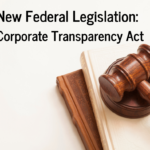Recently enacted changes which may affect your business regarding IRS audits of partnerships and limited liability companies (LLCs) have gone into effect for tax years beginning on or after January 1, 2018. Under the new Rules regarding partnership adjustments and audits, the IRS is no longer required to proceed against an individual partner but instead will access and collect the underpayment of tax from the partnership itself. As such, failure to amend a partnership or LLC’s governing documents could have potential unfavorable tax consequences (i.e. one partner/member could be liable for another partner/member’s underpayment of tax).
These new Rules implement the usage of a partnership representative (“PR”). Many LLCs have designated a tax matters partner who has very limited authority to act on behalf of a partnership/LLC, and other partners could continue to have the right to participate in audit proceedings before the IRS. In contrast, the PR has broad authority to act on behalf of the partnership/LLC before the IRS, may bind the partnership/LLC and the partners/members with respect to audits and other IRS proceedings, and has no legal obligation to notify other partners/members of an audit or keep the partners/members updated as to the status of an audit.
If an LLC does not designate a PR, the IRS will select someone regardless of whether the LLC already has a tax matters partner. Thus, having a properly designated PR, and including limitations of authority in the organization’s governing documents, is of the utmost importance to ensure that partners/members continue to be properly informed about happenings with the IRS.
These changes may dramatically increase the IRS audit rates for partnerships and LLCs, as the new Rules for assessments and collections will make it easier for the IRS to audit and assess tax.
Given the breadth of authority the PR has been given under the new Rules, it is generally recommended that a partnership or LLC formally implement limitations on the PR by amending its governing documents. Further, depending on a partnership or LLC’s membership structure, certain other changes and amendments to the partnership agreements and operating agreements will also need to be made to address these statutory changes.
Kahn, Dees, Donovan & Kahn, LLP is ready assist with reviewing current agreements and ensuring that any changes made are in the best interest of your business. KDDK has attorneys that are knowledgeable about the new Rules and are currently assisting clients in implementing these changes. For assistance with changes to your partnership or LLC governing documents, please contact attorneys Ashley R. Hollen at ahollen@KDDK.com or Matthew D. Malcolm at mmalcolm@KDDK.com or (812) 423-3183, or contact any member of the KDDK Business Law Practice Team.
About the Authors


Ashley R. Hollen, an attorney at Kahn, Dees, Donovan & Kahn, LLP (KDDK), in Evansville, Indiana, practices in the areas of business law, tax and employee benefits law, environmental law, real estate law, contract negotiation and creditors’ rights and collections. She is a responsive, goal-oriented attorney whose attention to fine details benefits clients she serves.
Matthew D. Malcolm, an attorney at Kahn, Dees, Donovan & Kahn, LLP (KDDK), in Evansville, Indiana, practices business law, tax law, real estate law, economic development law, creditors’ rights law, bankruptcy law, and debt collection law in the State of Indiana. Focusing on results, he is interested in meeting each client’s needs and providing quality counsel. Matt blends his business background with his legal knowledge. In doing so, he provides legal analysis and counsels his clients on the business and financial implications of a client’s legal options.




